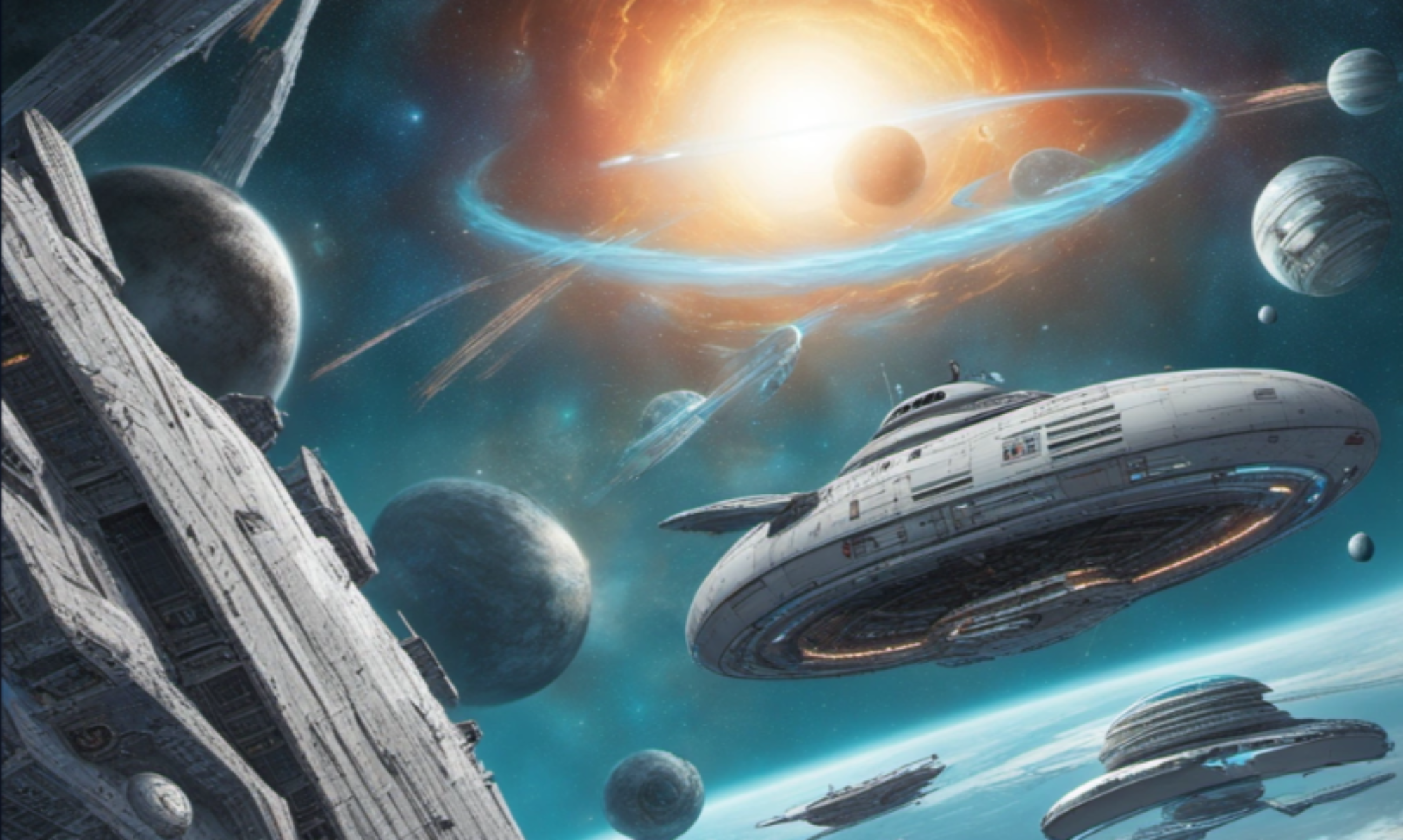Dimble climbed to the podium amid the loud applause of two people over-clapping.
“Thank you, thank you…thank you.” Dimble was both nervous and excited. “Today I’ll cover early settlement to the present day, exploring both its positive aspects, while also looking at things we could do better, and things we should not do at all.
“Although we are no longer governed by the Earthen Protectorate, nor do we obey every ruling of the League of Worlds, we must realise that inconsistent application of these laws is not a good example. Take the settlers of Crete 581d, well within their rights to settle an empty system, but not within their rights—fifty years later—to use it as a launching pad to probe other systems known to be inhabited.”
Zeen Crawdex raised his hand. “The settlers of Crete 581d didn’t come here of their own free-will. How could they be expected to follow the law?”
“That’s right,” Moonlake added, “Many were exiles from the Centauri bases, transported merely for stealing a resistor.”
Of course,” said Dimble. He cleared his throat. “And when Proxima Centauri no longer wanted to serve as an outpost for unreformed criminals, it became Luhman B’s turn. And yet here we are today, comfortably settled on Crete 581d, in orbit around a brown dwarf. But just because we were convicts.” He coughed. “I digress.” Each eye of the audience was an x-ray.
“Continue, please!”
Just as he was about to speak, one of the moths descended from a stage light and swatted his ear. It hovered in front of him, antennae wiggling.
Crawdex quietly laughed. “We have a guest speaker.”
Dimble was about to continue when the Tentacled Shrew returned. She had forgotten a scarf. But this time, surprisingly, she sat down, stroking the surrounding seats with five of her eight appendages.
“Thank you for coming.” A lump swelled in Dimble’s throat. He had forgotten what he was talking about. “It is thanks to moths and Shrews and Sirians and Baconians that humanity thrives, we all thrive.” He sipped some water. His hand shook.
“As you know, we discovered that the Cretan system was uniquely adapted for human life soon after we established outposts here in 2380. Since then, it has grown from neglected backwater, to industrial hub of the Orion Arm.”

“What was that?” Zeen Crawdex raised an arm. The girl had not understood and neither had Zeen.
“It’s simple.” Caspar Moonlake turned around. “Crete 581d was an underdog, this can’t be denied. But thanks to the ingenuity of our scientists, we harness the power of Luhman B through a matrix of heat-sensitive arrays and solar wind farms.”
Dimble collected his thoughts. He didn’t mind interruptions in his lecture. Especially when they ate into time he couldn’t fill. But the topic was veering widely off course and he was struggling to focus. “A thermal-Dyson sphere. Cosmic turbines. Luhman B, a fascinating star. But it’s not a star. Yet aren’t brown dwarfs mysterious? They have personality, much more so than regular stars. And as a source of energy‒” Dimble paused. It was time to mention the Zorgons.
He cleared his throat. “We all know that our planet, Crete 581d, orbits one of two brown dwarfs in a very strange system. Luhman 16 is an unlikely home for us. No one believed that such an abnormal place could harbor any planets conducive to terraforming, or provide the resources needed to build great self-sustaining superstructures. Yet now it hosts two colonies. And while Crete 581c falls short of what some historians might label civil‒”
The moth bit him on the nose.
Dimble did his best to ignore it. “That’s because Crete 581d, known simply as Crete, underwent dramatic transformation after Earth’s Grand Council granted additional funding, incentivising the pivot away from a sorghum-based agrarian culture to manufacturing, creating a rapidly expanding industrial hub. Crete is also an example of‒”
The Tentacled Shrew looked at one of her three watches. She gasped and hurried out.
Dimble coughed. “Where was I?” (He immediately regretted saying that.) “And with expansion came immigration.”
Three more Sirians entered. They had come to study, but for two minutes they gave Dimble their full attention.
“After immigration, came more immigration, more urbanisation and a dense metropolis. This meant more crime. But prudent vetting, policing and moderate surveillance, compelled most of the underground criminal syndicates to migrate their operations to Crete 581c, which they call Knossos.”
At the mention of crime, the three Sirians abandoned the card game they were about to start.
“Soon, the prisons of Crete 581d were overflowing with drug dealers, arsonists, debtors, grubbers, beggars, thieves, goons, cabalists, renegades, punks, pirates, luddites, grifters, assassins…and comedians.”
The audience doubled-over as Dimble finished the sentence. He had spent the better half of an hour writing it, so was pleased with its effect. And it was based on fact. In 2600, Earth’s Council of Plutocrats deported anyone openly mocking Earth and its heritage.
“There was no room left in the prisons for the common murderer. Something had to be done. Crete 581d needed a colony to house its prisoners. Every two years, Crete 581c’s orbit brings it close enough for transportation. Soon after, it is again far enough away to be out of sight, out of mind.“
“Swept under the matrix.” Moonlake folded his arms.
“Indeed. Left alone on a barren, barely habitable planet, strange things could, and did happen. This society of cutthroats thrived in its own peculiar way.” The Associate Professor raised his arms and briefly forgot the audience. “They dispatched explorers to catalogue mountains and plains, deserts and dunes. More settlements sprouted, some in the icy climes, others in caves. Being tidally locked to Luhman B, Crete 581c is cold on one side, hot on the other. Remarkably, we weren’t the first species to set foot in the Cretan system. Another technological civilisation—no one knows who—has here before: The lost civilisation of The Effians. So named because‒”
“Because no one knows who the f*!k they were.”
Dimble didn’t see who said this. But this was good news. More people had entered the auditorium. “You may be right,” Dimble said towards his heckler. “The Knossians of Crete 581c sometimes refer themselves as ‘The Effians’, and see their mission as a revival of Effian civilisation and culture‒”
“Even though they don’t know who the f*!k they were‒”
“Yes, yes, very perceptive.”
Moonlake turned around. “Shut the eff up.”
Dimble feared that his lecture would become the site of a brawl. He quickly continued: “Adoption of Effian practices can be seen as a rebellion, a deliberate disassociation from its antecedents on Crete 581d—a veritable raised middle finger towards colonial masters who had long since forgotten them. Early on, the only contact the Knossians had with other worlds, the only news they received from afar, was when a prison ship dropped off its latest cargo of untouchables. The arrival of more prisoners was always a cause for celebration. These were the only visitors they ever had: permanent visitors.”
He glanced at the wall clock. Only 10 minutes before the next talk. The hall was now a quarter full. Time had gone quickly. He allowed a smile to possess the bottom right of his mouth. Now was the time. “And, ladies and gentlemen, Sirians, moths and Tentacled Shrew, there is a new species on the block. The Zorgons. Do not underestimate them, for they possess the Antlers of Amplitude.”
A murmuring arose like a Mexican wave.
“Antlers of what?”
“Is the end of the literature lecture?”
“It could be archaeology.”
“No it’s sociology.”
“Seems more like political science.”
Dimble moved closer to the small microphone. “These aren’t ordinary antlers. Oh no. Not the twisted antlers of a deer, or the horns of a mastodon.”
“Who is this guy?”
“Sshhh!”
Dimble lightly tapped the microphone. “These antlers have the power to determine the fate of the Orion Arm!” This was overstating it, but he had the hall’s full attention.
In the silence that followed, he perceived a flicker to his right, the flash of a flablet light.
A Jovian Jellyfish, about to give the next lecture, needed his two assistants to wheel his tank on stage.
“Thank you students.” Half-hearted applause followed as Dimble concentrated very hard not to trip down the stairs. He was about to leave when he looked around for Caspar Moonlake. He was nowhere to be seen.
Zeen Crawdex walked up to him. “You ended on a cliffhanger.”
The Sirian girl said, “What did you mean by Ampules of Attitude?”
“Professor, why don’t you explain at the Quasar Bar?”
“Associate Professor,” Dimble corrected, and followed them out.
To be continued…
